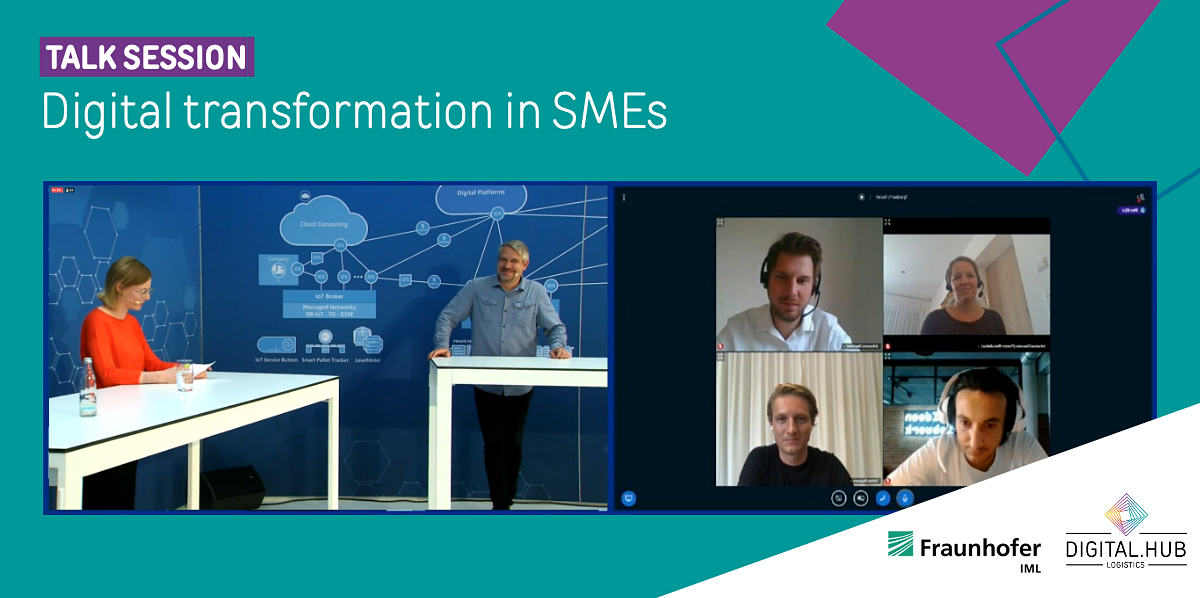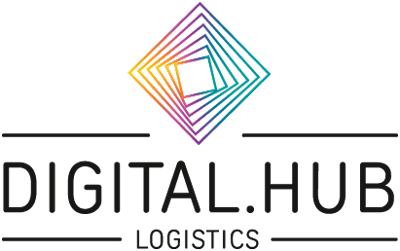
Hub session at future congress: Innovation in SMEs requires communication
Today, digital innovations give SMEs an immense competitive advantage – but more and more often, start-ups are threatening to outpace established companies. There is a recipe for “Digital Transformation in SMEs”, which five experts from business and science have now been able to agree on quickly in the Digital Hub Logistics session of the same name at the Digital Future Congress Logistics 2020. The recipe was communication – and in many respects. The session was moderated by Darja Kramer, innovation coach at the Digital Hub Logistics.
Johanna Claussen, co-founder of Pionier-Manufaktur from Worms, a consulting firm for small and medium-sized businesses, revealed how digitization can give a boost to mature companies: “I often suggest that companies first hold an ideas and creativity workshop with a colorful group of employees from very different areas of the business. Often it makes sense to invite a good customer to the round as well, who contributes the view from the outside”. Tobias Rappers, Managing Director of Berliner Maschinenraum, an innovation platform for family-owned companies, also pointed out the great importance of cooperation: “It makes sense for companies to shape the future together by working together across (cross-)sectors and thus using synergies in digital transformation projects”. Dr. Johannes Stemmer, Director Digital Transformation of the BEUMER Group based in Beckum, explained how the internationally active mechanical and plant engineering company has approached digitalization: “We actually looked at how other companies are doing it. After all, we weren’t the only ones who were concerned with the topic. The exchange was very helpful. Of course you can’t use the concepts as a blueprint. But every company has the opportunity to adapt them to its specific context.”
The BEUMER Group, for example, then became a member of the Dortmund Digital Hub Logistics with a start-in – a digital team independent of the parent company. There, the start-in relies on service offerings such as the coworking space, innovation support from an innovation coach, customized innovation modules and the community. In this context, Christian Prasse, Head of Strategic Development at Fraunhofer IML, emphasized the importance of cooperation between science and industry: “The hub is part of an innovation ecosystem in which research supports companies in developing their own products and digitally refining them. In doing so, we accompany these products beyond the prototype stage and into the market”. In this way, research results quickly moved from theory to practice. Laban Asmar, Strategic Product and Enterprise Design, Innovation Management Group, at the Fraunhofer IEM, also attached great importance to this. He advocated so-called transfer projects, in which companies and scientific institutions work on a digitization task from business practice within a manageable period of time. Such projects are already very common in the innovation ecosystem of the digital hub.
Evolution or revolution? How digitization is taking place
SMEs in particular are now faced with the question of how quickly and how consistently they must push ahead with digitization – even if or although their traditional business models still work. For Johanna Claussen from Pionier-Manufaktur, it was clear that companies need to take action: “The pressure to innovate is growing increasingly on medium-sized businesses! Dr. Johannes Stemmer from the BEUMER Group advised “ambidexterity”: “One should follow two strands: First, there is the question of how to make your core product digital. This is the evolutionary strand. The other strand is the search for new business models – and these can certainly be disruptive. However, the more disruptive a topic is, the more communication it needs, according to the experience of the Director Digital Transformation. Christian Prasse from Fraunhofer IML offered support, not least with the Digital Hub Logistics: “It is often a long way from sensitization to the topic to implementation. In any case, the discussion today has shown how important it is for companies to expand their own competencies in a targeted manner.





